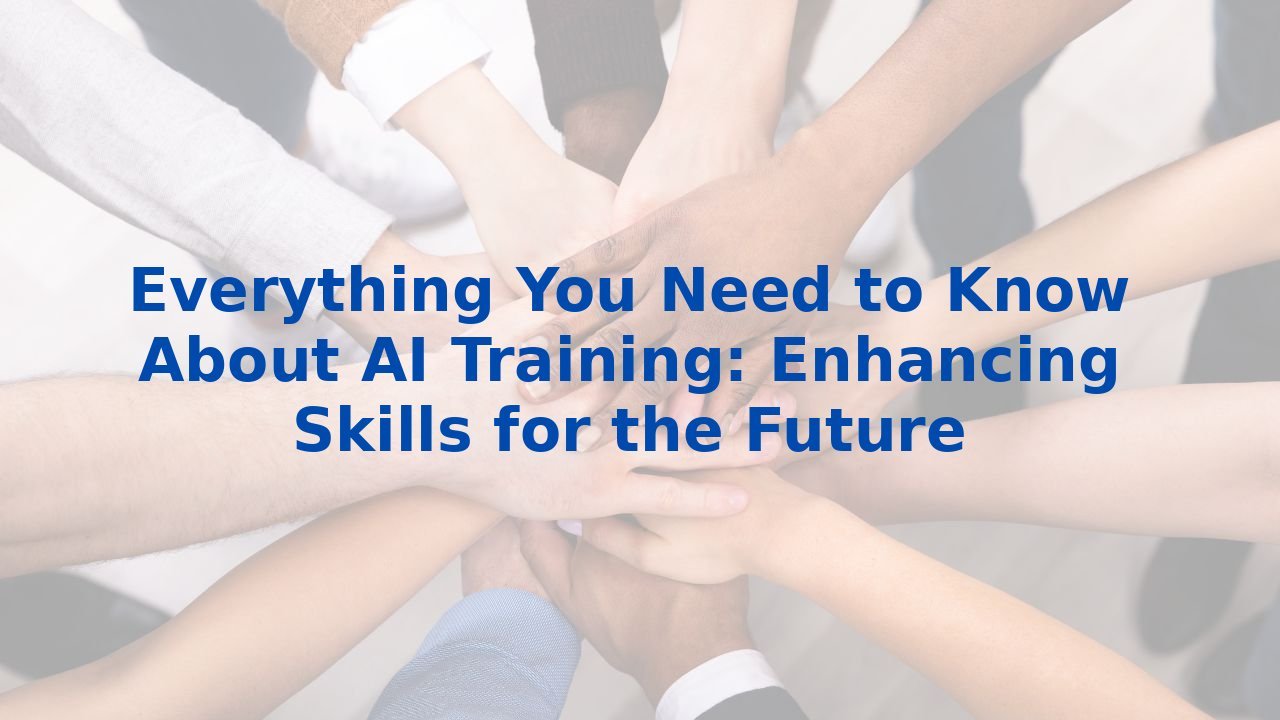Everything You Need to Know About AI Training: Enhancing Skills for the Future
Everything You Need to Know About AI Training: Enhancing Skills for the Future
In an era defined by rapid technological advancement, the relevance of Artificial Intelligence (AI) within organizations is more pronounced than ever. AI isn’t just a buzzword; it’s a critical asset for enhancing business processes and empowering employees. As companies strive to exceed their operational boundaries, understanding how AI training can transform not only employee skills but also the entire organizational framework becomes paramount.
The Evolution of Employee Training through AI
AI's role in employee training revolves around leveraging intelligent technologies such as machine learning and natural language processing. These technologies facilitate the creation of adaptive and personalized learning experiences, catering to the needs of every individual within the organization. No longer are we constrained by generic training programs. With AI, training becomes a tailored journey.
Benefits of AI-Enhanced Employee Training
“In the journey to mastery, the process is as significant as the outcome.”
Personalization: AI makes customizing learning pathways easy. Every employee has a unique skillset, and with AI, the training content aligns with their individual learning preferences. This personal touch not only captures attention but significantly increases retention rates, fostering genuine engagement.
Efficiency: The beauty of AI lies in its ability to automate mundane tasks, such as tracking progress and grading assessments. Instructors can therefore focus on high-value activities like mentoring and creating impactful content. Consequently, training programs become more efficient, ensuring timely delivery of meaningful feedback.
Scalability: As businesses grow, so do their training needs. AI-driven programs can scale seamlessly, maintaining consistent quality irrespective of the workforce size. Whether a start-up or an enterprise, everyone can benefit from uniform training standards.
Real-Time Feedback: Instant feedback is invaluable in any learning environment. AI enables quick assessments, allowing employees to adjust their strategies immediately. This rapid response animates skill development, giving learners the tools to evolve dynamically.
Continuous Learning: AI doesn’t stop at a single training cycle. By continually assessing performance metrics, AI adaptively modifies curricula to meet changing organizational needs. This fosters an atmosphere of perpetual growth where adjusting to new information becomes a natural part of the learning process.
Cost-Efficiency: With the reduction in costs related to traditional training methods—like printed materials and physical training spaces—organizations can allocate resources more strategically. Inclusive training opens up opportunities without straining financial reserves.
Predictive Analysis: AI goes beyond immediate training advantages by offering predictions based on comprehensive data analyses. Organizations can forecast skill requirements and workforce developments, positioning themselves proactively within their respective industries.
Improving Organizational Efficiency with AI
Imagine your business where repetitive tasks fade away, leaving only space for creativity and strategic thinking. AI can redefine operational efficiency in noteworthy ways:
Automating Repetitive Tasks: By streamlining routine operations, AI empowers employees to devote more time to critical decision-making and innovation.
Enhanced Decision-Making: Organizations can leverage AI's data analysis capabilities for informed decision-making. The evolution towards data-driven conclusions is crucial in reducing risks and improving outcomes.
Improved Customer Experience: Personalized interactions, driven by AI insights, enhance customer satisfaction, leading to loyalty and sustained business engagement.
Risk Management: AI’s analytical capabilities can be utilized to identify anomalies in operations, optimizing risk management and fraud detection efforts significantly.
Streamlining Supply Chains: AI optimizes the logistics chain by predicting demand and improving inventory management, leading to operational excellence.
The Value of Training Employees for AI
As AI revolutionizes business, the opportunity for employee upskilling emerges prominently. Organizations that invest in training not only gain adept workers but guarantee future resilience:
Upskilling Opportunities: Employees become integral to the organization's success by acquiring AI skills that enrich their professional value.
Enhanced Productivity: With training in AI tools, employees can shift their focus toward meaningful tasks, amplifying their overall productivity.
Competitive Advantage: Organizations prioritizing AI training can gain an edge over competitors. Skilled teams navigate challenges with agility, enabling proactive solutions and positioning their businesses as industry leaders.
Conclusion
AI integration into employee training and broader organizational processes offers an array of transformative benefits—personalization, efficiency, scalability, real-time feedback, continuous learning, cost-effectiveness, and predictive capabilities. As businesses migrate towards this digital-friendly age, embracing AI is not just advantageous; it becomes essential for sustained growth and innovation.
By investing in both technology and training, organizations craft a foundation for a resilient, agile workforce prepared to face the challenges of tomorrow. The question remains: Is your organization ready to embrace the future of AI and cultivate a spirit of continuous learning?
For organizations seeking to navigate their AI journey, consider exploring more on the possibilities and extensive resources available. Training is not just a necessity; it is a pathway to a dynamic and prosperous future.



